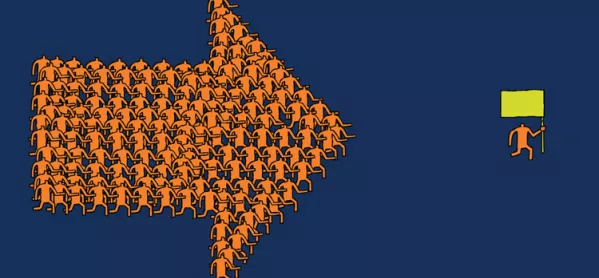At this time in the liturgical year, between Easter and Pentecost, thoughts understandably turn to questions of leadership, and to its less vaunted corollary, followership.
Education policy has followed the corporate and political worlds in emphasising the role of the leader in the success of an enterprise, occasionally falling prey to the tendency to attribute all of a school’s success or failure to its leadership. The cult of the superhead conjured up a cocktail with hints of Nietzsche, Ayn Rand and Red Adair.
The journalist Joshua Rothman points to the fact that “leadership” and “crisis” tend to feed off each other: “For leadership to exist, a leader must cross paths with a crisis … without (a) crisis, a would-be leader remains just a promising custodian of potential”. Après le deluge, c’est moi.
Demonstrating dominance
Susan Cain wrote a best-seller reclaiming the world for introverts. In a recent article she says that leadership qualities have gained ascendency as selection criteria by elite US universities.
To some extent it holds here too. Applicants are told they need to show evidence of leadership - it isn’t enough to list activities and accomplishments, they have to show that they lead, not just participate.
This is understood as an imperative to pursue opportunities to exert and exhibit authority and dominance.
The leadership trope goes back a long way, and was boosted by Thomas Carlyle in On Heroes, Hero-Worship and the Heroic in History (1841). Followership has no such pedigree - the term wasn’t even defined until 1988.
For its anatomists, followership is about commitment to a purpose, principle or person outside ourselves; underpinned by characteristics of courage, honesty and credibility. We might want to bracket successful followership with the ability to add value as a member of a team.
Ms Cain contends that the focus on leadership as a selector for competitive college courses distorts education, and undermines leadership itself, because it encourages students to value leadership for the sake of being in charge, rather than achieving something of substance.
In addition, it crowds out two groups of great value - team-players and “soloists”. Soloists are individualists who forge their own paths, and their contributions are evident in all spheres: “Art and science are about many things that make life worth living, but they are not, at their core, about leadership.”
Team players can be overlooked
Individual excellence is easily accommodated in our school system. Public exams pit the individual against all-comers, notwithstanding the thin veil of criterion referencing. It’s basically all about getting a higher mark than your peers.
“Leaders” and “soloists” both stand to benefit from competitive pen and paper summative exams. The system recognises and rewards supremacy in a silo.
But that system signally fails when it comes to team players.
Collaboration, when passed through the filtration bed of assessment, is separated out as plagiarism. It is left to extra-curricular opportunities to capture the essence of followership, collaboration and teamwork.
The UCAS personal statement offers space, if only we can be confident that selectors value quality modes of participation other than somehow being in charge.
Dr Kevin Stannard is the director of innovation and learning at the Girls’ Day School Trust. He tweets as @KevinStannard1
For more columns by Kevin, visit his back catalogue
Want to keep up with the latest education news and opinion? Follow Tes on Twitter and like Tes on Facebook





